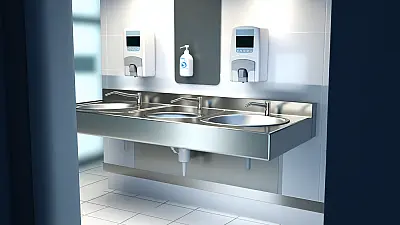BISMARCK, ND - State health inspectors identified critical infection control failures at St Vincent's - A Prospera Community during an April 2025 complaint investigation, documenting improper catheter care procedures and perineal hygiene practices that increased residents' risk of serious urinary tract infections.

Staff Failed to Use Required Protective Equipment During Catheter Care
Inspectors observed a certified nursing assistant emptying a resident's urinary drainage bag without wearing the required protective gown, violating the facility's Enhanced Barrier Precautions (EBP) protocols. The incident occurred on April 2, 2025, when CNA #4 entered Resident #78's room to empty the urinary drainage bag. While the staff member applied gloves and cleaned the catheter tubing with an alcohol swab, they failed to don the protective gown mandated for high-contact care activities involving medical devices.
The resident's care plan specifically stated that staff must "wear disposable gloves and gown when performing high contact resident care activities" due to the presence of an indwelling urinary catheter. The facility's own infection control policy, revised in April 2024, clearly defined catheter care as a high-contact activity requiring full personal protective equipment under Enhanced Barrier Precautions.
Proper barrier precautions during catheter care are essential to prevent the spread of multidrug-resistant organisms and healthcare-associated infections. When staff handle urinary catheters without appropriate protective equipment, they risk contaminating their clothing and subsequently transmitting pathogens to other residents during care activities. This is particularly concerning in nursing home settings where residents often have compromised immune systems and multiple chronic conditions that make them vulnerable to serious infections.
Improper Perineal Care Technique Documented for Resident with Recurring UTIs
Inspectors documented concerning perineal care practices for Resident #25, who had a documented history of recurring urinary tract infections requiring hospitalization. On April 1, 2025, observers witnessed CNA #3 performing perineal care using a back-to-front wiping motion, directly contradicting the facility's policy requiring "gentle downward strokes from the front to the back of the perineum."
This resident's medical history revealed a pattern of serious infections, with positive urine cultures documented in November 2024, February 2025, and March 2025. The severity of these infections was evident in the resident's February 2025 hospitalization, which lasted four days and required intravenous antibiotic treatment. Despite this concerning medical history and the resident's care plan identifying them as "at risk for bladder infections," staff failed to follow basic hygiene protocols designed to prevent bacterial contamination.
The back-to-front wiping technique observed by inspectors creates a direct pathway for fecal bacteria to enter the urethra, significantly increasing the risk of urinary tract infections. For elderly nursing home residents, UTIs can lead to serious complications including sepsis, kidney damage, delirium, and increased mortality risk. Proper perineal care technique represents one of the most fundamental infection prevention measures in long-term care settings.
Multiple Care Standard Violations Compound Infection Risks
During the same observation, inspectors noted that Resident #25 was wearing two briefs with a liner, causing discomfort and sleep disruption. The resident stated it was "hard to sleep and uncomfortable" with the double briefs. CNA #3 acknowledged during an interview that "staff are not supposed to double brief residents," indicating awareness of proper protocols while failing to follow them.
Double briefing creates a warm, moist environment that promotes bacterial growth and increases infection risk, particularly problematic for a resident with recurring UTIs. This practice also violates dignity standards and causes unnecessary discomfort, as the resident directly reported to inspectors.
Administrative staff interviewed on April 3, 2025, confirmed these violations represented failures to meet facility standards. Two administrative staff members acknowledged that perineal care "was not completed correctly" and confirmed expectations that staff wear gowns when performing high-contact care for residents under Enhanced Barrier Precautions.
Additional Issues Identified
Beyond the primary infection control violations, inspectors noted systemic issues with staff compliance to established protocols. The facility had appropriate policies in place, including detailed Enhanced Barrier Precautions guidelines and perineal care procedures, yet staff failed to implement these measures consistently. The presence of proper signage on Resident #78's door and available protective equipment at the room entrance indicates that resources were available but not utilized correctly.
These infection control failures pose risks not only to the affected residents but to the entire facility population. Healthcare-associated infections spread rapidly in congregate care settings, and lapses in basic hygiene and protective equipment use can trigger facility-wide outbreaks. The documented violations demonstrate a need for comprehensive staff retraining on infection prevention protocols and enhanced supervision to ensure consistent implementation of care standards.
Full Inspection Report
The details above represent a summary of key findings. View the complete inspection report for St Vincent's - A Prospera Community from 2025-04-03 including all violations, facility responses, and corrective action plans.
💬 Join the Discussion
Comments are moderated. Please keep discussions respectful and relevant to nursing home care quality.